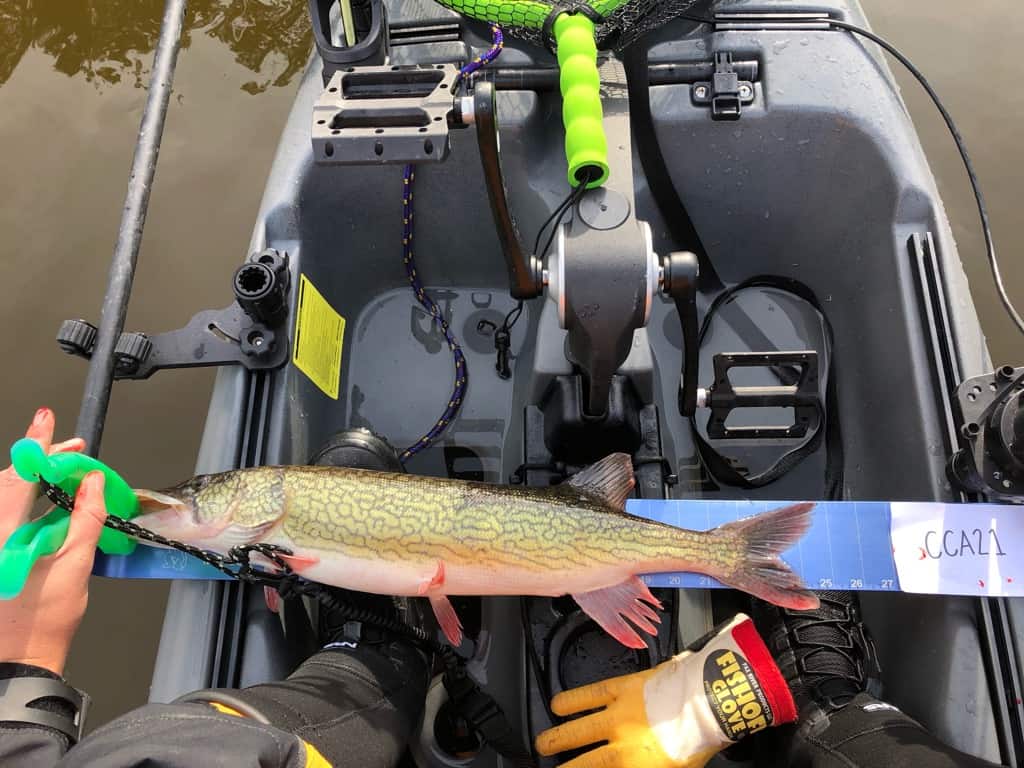Sporting Life

Autumn is Prime for Pickerel
By David Sikorski
Editor’s note: Dennis Doyle’s Sporting Life column returns next week. This week, David Sikorski, executive director of Coastal Conservation Association Maryland, fills in.
Daylight saving time has now ended and, for me, the recent frost was a good reminder that it might be time to start wearing socks sometime soon.
It also reminds me that now is a great time to hit the water. Sure, throughout the Bay region marina lots and side yards are filling up with wrapped and winterized boats, but for a small group of the most intrepid anglers, this time of year just means more peace and quiet on the water, or at least along its banks. If you fit this description, you know that it’s the perfect time to find a place in the sun on or along the banks of a local waterway to try and pursue a unique species available in more places than you might think, the pickerel.
The chain pickerel (Esox niger) is a close relative of the northern pike or muskellunge, two widely regarded (and large) gamefish species. Pickerel are readily available throughout the Delmarva region, and are getting more active by the day. Chain pickerel aren’t as big as their aforementioned cousins, but they might just be hanging out in your local pond or near your dock, or neighborhood beach in the fresher areas of Bay tributaries. Maryland DNR awards anglers with a citation award for the catch of fish over 24 inches, so this is the mark if awards are your thing. Delaware also has some great spots that hold healthy populations of these great fish, so don’t be afraid to take a road trip with a kayak and the proper safety equipment this winter.
A chain pickerel of citation size is definitely of breeding age, an activity that starts for them in March, so consider carefully releasing the biggest of these fish back to our waterways and remember to give them a break come March.
To properly release a pickerel you should carefully support the fish’s body weight using a rubberized and knotless landing net. When touching them, do not use a dry towel or anything that will compromise their protective slime. A fish gripper is a great tool to carefully control their toothy mouth as you remove your lure or bait with pliers and taking the time to revive them is always the responsible thing to do. Remember that the air is colder than the water, so if it’s cold enough for ice to form on your fishing tackle, this can have a lethal impact on the fish if kept in freezing air temperatures for very long.
Smashing the barbs on your hooks is another great way to limit your impact on the fish you catch. Modifying treble hooks is also a smart choice, a tactic that may just save you from feeling the business end of a lure and ending a fishing trip with some minor surgery or a tetanus shot.
Chain pickerel are an ambush predator and largely feed by sight. Like all fish, they also feel vibrations through the water, so your favorite perch or bass tackle might fit the bill for them, too. Shad darts or small perch jigs tipped with a live minnow and fished under a bobber is a popular way to fool a pickerel and an equally good way to catch nearby perch and bass. While not as active in the winter, snakehead, catfish, and small striped bass might be found in the same waters, especially if the sun is shining against a dark bottom and you’re fishing tidal waters that contain these popular species. Spinners, jerk and crank baits, and flashy flies are also great choices along with soft plastic swim baits or jerks shads on light jigs, weighted and weightless worm hooks.
Any small or medium rod and reel can handle an average sized pickerel, so fish with what you are comfortable with, but don’t forget their teeth. A fluorocarbon leader of 15-plus pounds is recommended to avoid a bite-off and check your leader and knots after each catch. My preferred way to pursue these fish is with a 5- to 7-weight fly rod and intermediate or floating line. I stick with flashy clouser minnow style flies tied sparsely on laser sharp hooks.
For more tips on pickerel fishing this winter or if you are interested in competing with your fellow anglers for some prizes, check out Episode 20 of the What’s on the Line podcast (ccamd.org/whats-on-the-line-podcast/) where we discuss the 2021-22 CCA Maryland Pickerel Championship and annual fishing tournament (ccamd.org/pickerel-championship).
David Sikorski is the Executive Director of Coastal Conservation Association (CCA) Maryland, a statewide chapter of the nation’s largest angling-based membership organization that advocates for the health of our shared coastal resources.
